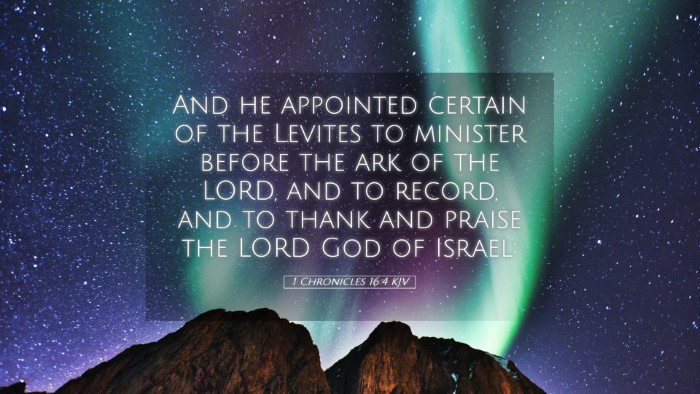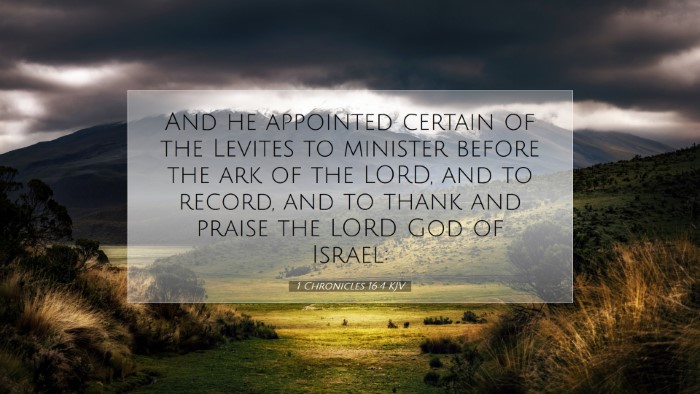Commentary on 1 Chronicles 16:4
Verse: 1 Chronicles 16:4 - "And he appointed certain of the Levites to minister before the ark of the LORD, and to record, and to thank and praise the LORD God of Israel."
Introduction
This passage situates itself within the context of King David’s efforts to bring the ark of the covenant to Jerusalem, reflecting his desire to restore proper worship to God. The verse highlights the role of the Levites in this worship and their responsibilities in leading the people in praise and thanksgiving. This commentary draws from the insights of well-established public domain commentaries, aiming to elucidate the significance of this verse for pastors, students, theologians, and Bible scholars.
Historical Context
The book of Chronicles serves as a historical narrative that focuses on the Kingdom of Judah, presenting a theological reflection on Israel’s history. In this particular passage, David's leadership is pivotal. His desire to establish worship in Jerusalem shows a return to God-centered governance, which is crucial for the national identity of Israel.
Matthew Henry's Commentary
Matthew Henry observes that the appointment of the Levites signifies a structured approach to worship, which was vital in fostering a communal atmosphere of reverence. He notes that the Levites had specific roles and their ministry was not merely functional but deeply spiritual. The Levites’ job was multifaceted—recording histories, offering prayers, and leading songs of praise, which were essential components of worship.
Albert Barnes' Perspective
Albert Barnes provides insight into the significance of “to record.” He emphasizes that documenting the deeds of the Lord and the history of Israel's worship served not only as a remembrance but also as a teachable element for future generations. The Levites’ function as scribes was therefore critical to maintaining an understanding of God’s past actions, encouraging a culture of gratitude and acknowledgement of divine providence.
Adam Clarke's Notes
Adam Clarke elaborates on the liturgical aspects of the Levite’s roles. He mentions that the ministry before the ark was essential as it symbolized the presence of God among His people. The intertwining of singing, thanking, and praising the Lord illustrates a holistic approach to worship where emotional expression is united with truth and teaching. Clarke emphasizes that this ministry was vital to moving the people’s hearts toward God, reinforcing the connection between worship and community identity.
Theological Implications
This verse opens up numerous theological implications related to worship, community, and the nature of service. The Levites were not merely temple attendants; they were custodians of Israel's spiritual heritage. Their responsibilities highlight the multifaceted nature of worship, integrating music, record-keeping, and prayer as vital elements. This can inform modern worship practices and understanding of community ministry.
Worship as a Community Responsibility
Worship is portrayed as a communal activity, where each member's contribution is significant. The Levites' role emphasizes that worship is not limited to the king or elite; instead, it invites participation from the whole community of believers. This encourages contemporary leaders to cultivate inclusive worship environments that allow for broad participation.
The Importance of Memory and Gratitude
Both Barnes and Henry highlight the notion of remembering God’s works, suggesting that part of the worshipping community's function is to recount and celebrate God’s history with them. This can lead believers to cultivate an attitude of thankfulness, impacting their lives and congregations positively. Pastors today can draw from this to teach the importance of testimonials and recounting God's goodness as a form of worship.
Worship Built on Truth and Spirit
The comprehensive role of the Levites serves as a model for how worship should be conducted: it must be rooted in truth about God while also engaging the spirit of the worshippers. This parallels with Jesus' emphasis on worshipping “in spirit and in truth” (John 4:24), reinforcing that worship is both a heartfelt response and an informed practice.
Practical Applications for Today
1 Chronicles 16:4 has practical implications for modern worship leaders, pastors, and congregational members.
- Emphasizing Structured Worship: Just as the Levites were appointed with specific duties, contemporary worship should reflect a structured approach that honors God while engaging the congregation.
- Role of Music in Ministry: The Levites' musical role showcases the importance of worship music in expressing communal identity and fostering spiritual growth. This encourages today's church leaders to prioritize the music ministry.
- Engaging the Congregation: This verse encourages leaders to inspire congregational participation in worship, involving them in diverse roles that reflect their gifts and encourage communal engagement.
- Preserving Memory: Just as the Levites recorded historical accounts, modern congregations should keep narratives of God’s faithfulness alive through testimonies and shared stories.
- Teaching Holistic Worship: Worship that integrates various expressions—prayer, song, and giving thanks—must be modeled in today's churches, reinforcing the connection between corporate worship and individual spirituality.
Conclusion
1 Chronicles 16:4 serves as a powerful reminder of the essential nature of structured, thoughtful worship within the community of faith. The Levites' assignment to record, thank, and praise the Lord encapsulates the essence of worship - a unified, holistic approach grounded in remembering God’s actions and expressing gratitude. In today’s context, these insights urge church leaders and congregants alike to revive a commitment to authentic worship that honors God and fosters community.


